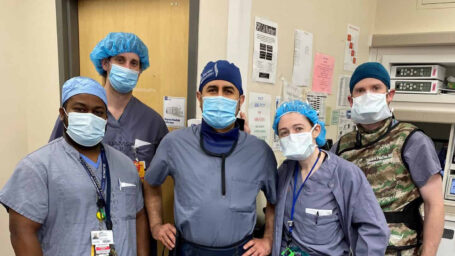What Makes UAMS So Special?
Overview
The Neurological Surgery Residency Program at the University of Arkansas for Medical Sciences involves seven years of neurosurgery including the PGY-1 year. A three month mandatory neurology rotation can be arranged during the PGY-1 year. Four of these years are devoted to clinical experiences with faculty supervision at the UAMS Medical Center, Arkansas Children’s Hospital, and the John L. McClellan Memorial Veteran’s Hospital. One year is set aside for individual elective work and can include the necessary basic science and allied clinical experiences. During the clinical years, increasing clinical and administrative responsibilities flourish. Residents start to operate early, being involved totally in the management of the neurosurgical patients: out-patient, in-patient, operative, postoperative, and critical care. The Department of Neurosurgery sees patients across the wide spectrum of diseases and all levels of case complexity.
The faculty members in the Department of Neurosurgery are full time members of the UAMS College of Medicine with various areas of subspecialty expertise. There is a full complement of neuroradiology and related disciplines at each of the three training institutes. At each training facility, neurosurgical patients are provided care on designated units. Neurosurgical intensive care units are established at both adult hospitals. Neurosurgical operating rooms with state of the art equipment including operative electrophysiological monitoring, image-guided, and endovascular technique are standard. Resources are available for the education of neurosurgical residents in anesthesia, pathology, general surgery, neurology, internal medicine, pediatrics, ophthalmology, orthopedics, radiology, otolaryngology, and endocrinology. In the elective and research year, the individual has the option of serving as an instructor in the freshman level neuroscience course. Concurrent with their teaching, residents benefit from time spent in a research lab working on a clinical or basic project on their own or as a collaborator in an ongoing project. It is the responsibility of one of the faculty members to assist the residents in achieving his/her research goals.
Junior medical students are assigned to neurology and neurosurgery for a four week period, and there are senior electives available for fourth year students. Residents are assigned the responsibility of student instruction at all levels and assigned responsibilities at the three institutions.
Conferences include a weekly preop conference, monthly morbidity and mortality conference, a monthly neuroradiology conference at the UAMS Medical Center, and monthly subspecialty conferences. A departmental journal club meeting occurs monthly. Residents are encouraged and supported to present at regional and national meetings.
Satisfactory completion of the training program requires a passing grade on the written examination sponsored by the American Board of Neurological Surgery.

